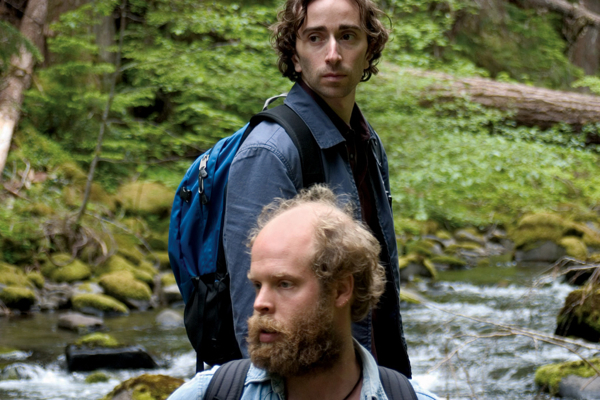Movie review by Greg Carlson
Kelly Reichardt’s “Old Joy” is a wispy but mostly well-observed rumination that contrasts the life paths of two friends who have grown apart. Essentially an “anti-buddy” movie, Reichardt’s film intends to accomplish a great deal in the margins of its frames and the silences on its soundtrack. Some moviegoers will connect with the tension between the responsibilities of settling down and the romantic allure of living to the beat of one’s own drum, while others will find the rapport between the central characters alienating and off-putting. “Old Joy” has as many flaws as it does charms, and to its great credit, a spare running time prevents it from wearing out its welcome.
Soon-to-be-father Mark (Daniel London) somewhat reluctantly agrees to accompany pal Kurt (Will Oldham) on a quickie camping trip to the Bagby Hot Springs in Oregon. Seeking approval from his scowling wife, Mark embarks anyway, and his lazy drive to fetch Kurt, underscored by Air America broadcasts on the radio, sets the movie’s minimalist tone. Once onboard, Kurt babbles about recent travels that have expanded his mind, trying to convince himself as much as his companion that drum circles and bonfire jumping have salved his spirit.
Reichardt, adapting the screenplay with Jonathan Raymond from his short story, easily sketches the sense of fleeting youth through beautifully composed shots from the windows of Mark’s Volvo station wagon. Anyone who has ever sought retreat by means of a road trip into the wilderness will recognize the diners and gas stations that appear between the stretches of woods as the city turns into the country. Predictably, Mark and Kurt cannot initially find the place they’re seeking, but once they do, Reichardt constructs a potent scene at the hot springs. Kurt shares the story that provides the movie with its title as Mark sits quietly nearby. A moment passes between the two friends that ripples with an uneasy acknowledgment of something Reichardt purposefully leaves up to the viewer to determine. It is the film’s strangest, saddest passage.
“Old Joy” doesn’t comment more authoritatively on the dropout/contributing citizen divide than Richard Linklater’s superior “Slacker,” a much stronger movie that covers a great deal of the same ground. “Old Joy” bypasses the self-deprecating humor of “Slacker,” and as a result, a blanket of melancholy settles over practically everything that Mark and Kurt experience together. Certainly, Reichardt purposefully withholds all kinds of explicit information about the sorts of things that have passed between the two men, but her reticence tends to generate the kind of frustration that comes from someone who refuses to share a secret, choosing instead to taunt and tease.
While neither of the central characters is thoroughly drawn, the performers manage to create familiar, recognizable types. As the more loquacious Kurt, Oldham strikes a neat balance between tiresome palaver and warm insight. Masking his neediness behind a façade of easygoing cool, Oldham delivers the sadness necessary to make the audience occasionally experience the depths of Kurt’s regret and uncertainty. Reichardt’s final shots of Kurt are the most haunting images in the movie. Despite his copious indie credibility, however, Oldham remains a more accomplished musician than a movie actor, although his presence is one of the joys of “Old Joy.”
